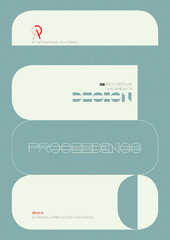Приказ основних података о документу
The essence of place: Understanding Genius Loci through phenomenology
| dc.creator | Lokas, Iva | |
| dc.creator | Petrović, Relja | |
| dc.creator | Rakonjac, Ivana | |
| dc.date.accessioned | 2023-12-15T12:58:08Z | |
| dc.date.available | 2023-12-15T12:58:08Z | |
| dc.date.issued | 2023 | |
| dc.identifier.isbn | 978-86-89111-34-7 | |
| dc.identifier.uri | https://raf.arh.bg.ac.rs/handle/123456789/1878 | |
| dc.description.abstract | The concept of genius loci is rooted in the idea that people who spend time in a particular place create its atmosphere and character. Phenomenology, a philosophical perspective that emphasizes the subjective experience of individuals, is particularly relevant in understanding and experiencing the genius loci. Phenomenology emphasizes the need to acknowledge existing patterns of space usage and reflect on the spirit of the place rather than imposing a homogenous design that aims to protect the built environment. By focusing on the lived experiences and perceptions of individuals within a place, instead of enforcing predetermined values or interpretations, we can better understand and preserve its genius loci. Based on the presented previous research in this paper, it is clear that the current approach to understanding genius loci should shift its focus from signifiers of the past to the users who actively shape and experience the place in the present. The theoretical framework of this paper is defined by Husserl's and Heidegger's perspectives on phenomenology – transcendental approach and hermeneutic approach. The aim of this paper is to emphasize the importance of understanding the unique qualities and characteristics of a location and integrating them into the design process. By focusing on the subjective experiences and perceptions of individuals, designers can create spaces that are meaningful, authentic, and reflective of the community they serve. The essence and uniqueness of a place are defined by the spirit of the place, which connects the tangible and intangible components of the environment. As the intangible quality that gives a place its unique character and atmosphere, the spirit of the place encompasses the feelings, moods, and attitudes associated with a place, as well as the cultural and historical context that shapes its identity. The outcome of this research showed that the essence of a place lies in the perceptions and experiences of its inhabitants, rather than its physical structures and historical artifacts. | sr |
| dc.language.iso | en | sr |
| dc.publisher | Belgrade : STRAND - Sustainble Urban Society Association | sr |
| dc.relation | This research was funded by the Ministry of Education, Science and Technological Development of the Republic of Serbia, grant number 451-03-68/2020-14/200090. This research is carried out with the financial support of the Ministry of Science, Technological Development and Innovation of the Republic of Serbia, according to the contract on the realization and financing of scientific research work of the Institute of Architecture and Urban&Spatial Planning of Serbia in 2023, registration number: 451-03-1148/2023-03. | sr |
| dc.relation | info:eu-repo/grantAgreement/MESTD/inst-2020/200090/RS// | |
| dc.rights | openAccess | sr |
| dc.source | On Architecture - Challenges in Design : Proceedings / 11th International Conference, December 2023, Belgrade | sr |
| dc.subject | spirit of the place | sr |
| dc.subject | tangible values | sr |
| dc.subject | intangible values | sr |
| dc.subject | atmosphere | sr |
| dc.subject | transcendental approach | sr |
| dc.subject | hermeneutic approach | sr |
| dc.title | The essence of place: Understanding Genius Loci through phenomenology | sr |
| dc.type | conferenceObject | sr |
| dc.rights.license | ARR | sr |
| dcterms.abstract | Ракоњац, Ивана; Петровић, Реља; Локас, Ива; | |
| dc.citation.spage | 215 | |
| dc.citation.epage | 224 | |
| dc.identifier.fulltext | http://raf.arh.bg.ac.rs/bitstream/id/6516/STRAND2023_proceedings_IL-RP-IR.pdf | |
| dc.identifier.rcub | https://hdl.handle.net/21.15107/rcub_raf_1878 | |
| dc.type.version | publishedVersion | sr |

